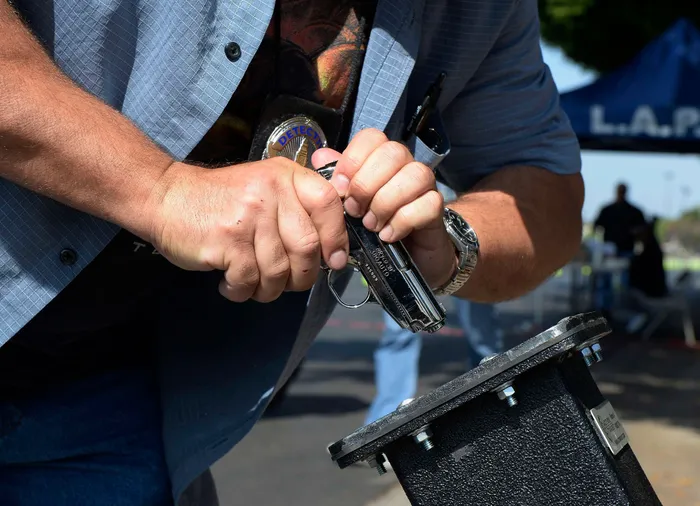
The proposed new guns law – which seeks to criminalise possessing a firearm for self-defence – has come in for even more scrutiny due to the ill-preparedness of the police during the recent civil unrest. A police officer clears a surrendered handgun during a gun buyback event at Los Angeles Sports Arena in Los Angeles, California. REUTERS/Kevork Djansezian (UNITED STATES - Tags: SOCIETY CRIME LAW)
DURBAN - The proposed new guns law – which seeks to criminalise possessing a firearm for self-defence – has come in for even more scrutiny due to the ill-preparedness of the police during the recent civil unrest.
As the window of opportunity for the public to comment on the Firearms Control Amendment Bill closes next Monday, several lobby groups have slammed the bill as an ill-advised weapon aimed at destroying the ability of vulnerable citizens to defend their right to life.
But some security experts say the bill may be the right way to go as a deterrent to gun-based crime.
Among those opposed to the bill are the Afrikanerbond, the FW de Klerk Foundation, AgriSA and the DA opposition party.
The groups argue that the ill-preparedness of the police was compelling evidence that citizens should do something about their safety.
Dr Guy Lamb, a University of Stellenbosch lecturer on policing and crime, said that through the act, the government sought to eliminate legally owned arms ending up in the illegal arms sector.
“Most of the firearms that are used in criminal activities are often the weapons that have either been stolen or robbed from licensed owners,” said Lamb.
“It (licensed gun ownership) is a complicated issue to which one cannot give a ‘yes’ or ‘no’ answer. We can say that a business owner, for instance, needs a gun to defend himself during a robbery. But research has also shown that owning a firearm as a business person can sometimes compromise your safety. There have been cases where shooting somebody can agitate the community who would want to attack that business person,” he said.
KwaZulu-Natal violence monitor Mary de Haas was particularly concerned about how semi-automatic and automatic weapons ended up in the hands of private security companies when those should be for the exclusive use of the army and the police.
“My own very serious problems with firearm possession relates to the type of weapons security companies are permitted to carry. Much of the time for no apparent good reason. For example, a cash-in-transit company needing rifles is one thing but for most purposes it is not clear why so many companies have such weapons,” said De Haas. She raised her concern with the Private Security Industry Regulatory Authority in 2019.
AgriSA said: “In a country with one of the highest murder figures in the world, it is unthinkable that communities cannot exercise their right to life by protecting themselves, which will be the case if the police succeed in amending the Firearms Control Act by scrapping the right to self-defence.”
“Recent crime statistics released by the police not only indicate an increase in the murder figure for the fourth quarter, but also confirm that home robberies remain rife. Home robberies are the crimes most feared by the farming community and fellow citizens and to which they are most exposed. Criminals will use any weapon conceivable to achieve their objectives. Therefore, it is important that citizens are able to defend themselves,” said Uys van der Westhuijzen, the chairperson of the farmers’ rights advocacy group’s Centre of Excellence: Rural Safety.
The FW de Klerk Foundation said it was alarmed by the proposed law: “The protection of the lives and persons of citizens is generally regarded as the most fundamental function and duty of any state. Yet, in the case of South Africa, it is a duty that the State has lamentably failed to carry out.”
“While it is the State's responsibility to enforce law and order and ensure stability, in recent weeks it has failed to carry out this mandate,” said Jan Bosman, the Chief Secretary for the Afrikanerbond.
“Across the country, it fell to South Africans to secure themselves, their families and their properties at a time of large-scale riots and anarchy. There is currently no indication that the situation has improved sufficiently to restore the public's confidence in either the police or the defence force,” said Bosman.
“In this time of heightened tension, the last thing that South Africans across the political and racial spectrum need is to be deprived of their firearms by means of the proposed legislation. If the minister insists on depriving South Africans of the right to possess firearms, it would greatly increase the potential for alienation and disobedience,” he said.
“The bill seeks to disarm law-abiding citizens and force them to rely on a police service which is understaffed, under-resourced and which has failed to combat crime. The recent violent unrest and looting in parts of KwaZulu-Natal and Gauteng demonstrated the police's inability to effectively deal with crime,” said Andrew Whitfield, the DA’s spokesperson on police.
THE MERCURY
Related Topics:
